IFLA WLIC 2023: Day Two Highlights
05 فبراير 2024
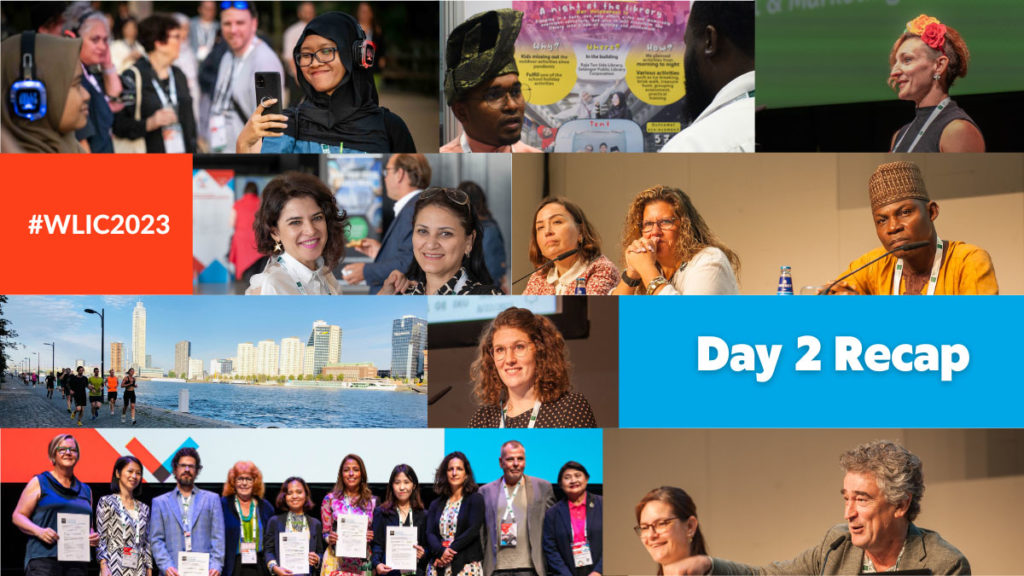
Along with some great impressions from the cultural evening at the Rotterdam Zoo, poster sessions, and videos featuring delegates, our Day Two recap of IFLA WLIC 2023 focuses on some of the incredible work our many professional units and committees are presenting during WLIC week. With over 50 sessions taking place just on 22 August, there is a lot to choose from. Here are some highlights!
Cultural Evening at the Rotterdam Zoo
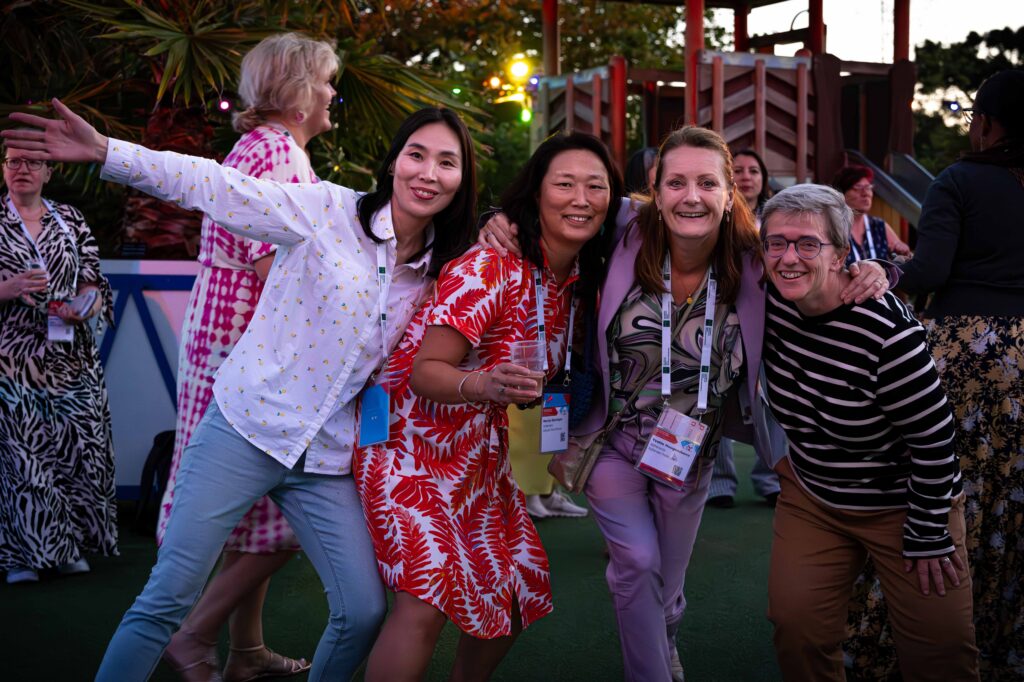
Rotterdam Zoo Blijdorp hosted the IFLA WLIC cultural evening Tuesday night. The doors of the zoo were opened after hours especially for congress delegates to enjoy snacks and drinks, fun acts, music and a silent disco. And some very patient animals!
IFLA delegates were taken from the Ahoy Convention Centre to Blijdorp by bus. During the first part of the evening, the entire zoo was open and visitors could enjoy the beautiful aquariums, polar bears, lions, elephants and giraffes. Accompanied by a Shanty choir or animal act, visitors could enjoy delicious fries or a Dutch croquette. The second part of the evening mainly took place around the main entrance. As the evening progressed, more and more dance moves were shown and people from all over the world danced together to the sounds of the silent disco.
Photos from the Cultural Evening are available in a separate Flickr album.
Poster Sessions
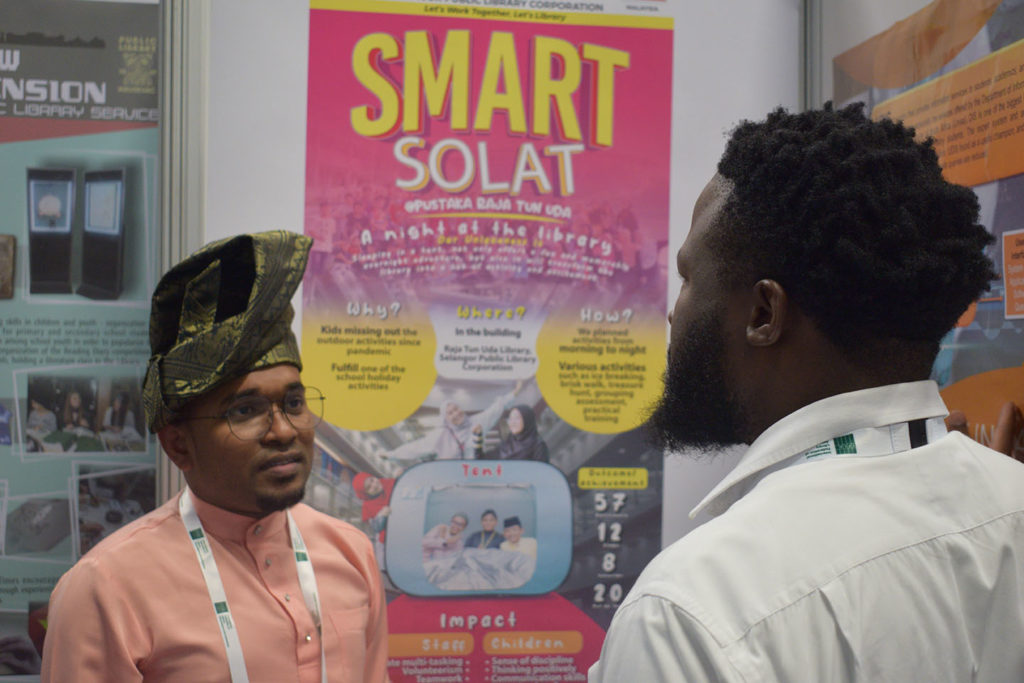
Nearly 200 posters are on display as a part of our Poster Session in the Exhibition area. The creative and enthusiastic presenters were on hand to explain their work in two-hour sessions on Tuesday 22 August and repeated on Wednesday 23 August.
The “Best IFLA Poster 2023″ will be selected from the posters presented in Rotterdam by a jury on behalf of the IFLA Professional Council. This year, another award category has been introduced: “People’s Choice Poster 2023”. All conference participants are invited to vote for the “People’s Choice Poster 2023”. Both categories will be awarded during the Closing Ceremony on Thursday 24 August.
Posters will be made available online on the conference digital platform for audience voting (for both onsite and online participants) and have been added to the IFLA Repository.
Photos from the sessions are available on our IFLA Flickr.
Around the World in 7 Marketing Campaigns #marketinggenius
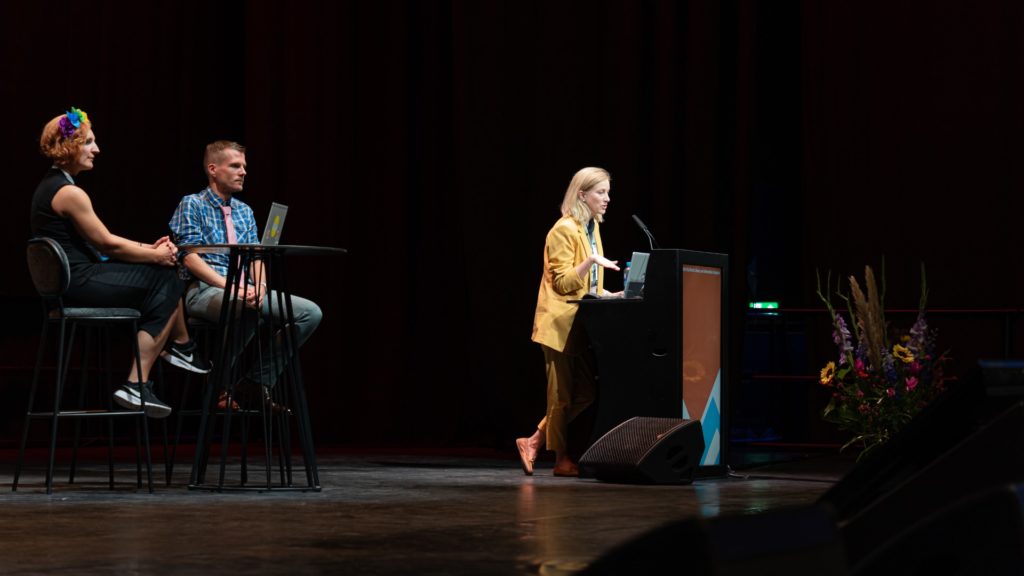
During the IFLA Management & Marketing Section’s “Around the World in 7 Marketing Campaigns session,” WLIC attendees were inspired by a wide variety of projects and programmes. Each library was recognised by the 2023 IFLA PressReader International Marketing Award.
- The Around the World in 26 Libraries program, created by the Sistema de Bibliotecas Públicas de Medellín, coordinated local artists and community leaders to create an experience where their patrons could virtually travel to different cultures. The programme invites everyone to “create a better world through libraries.”
- Brooklyn Public Library created the intellectual freedom project Books Unbanned, which provides complete, unrestricted access to the library’s ebook and audiobook collections to all U.S. teenagers. The campaign promotes the establishment of teen advocate councils to push back on censorship in the U.S. and celebrates Banned Books Week in September.
- The Foshan Library’s project, “Ex-Book: Old Flame, New Joy,” established family collections, providing the ability for individuals to loan their own books to others within the area. This book exchange helps augment the library’s collection and increases patrons’ time spent reading.
- Jiaxing Library launched the “Listen Within: Audio Box” programme in 2022, providing user-friendly audiobook devices for children, visually impaired users, and those with low literacy. The low-cost devices do not require Internet access and were checked out 12,000 in one year.
- The “20 years, 20 gifts” project reinvigorated the Municipal Library and Information Centre of Gödöllő on their 20th anniversary. They invested in a makerspace, bicycles for home delivery, and self-service book boxes, and ran events such as reading challenges, a photo exhibit, and the filmed performance of a newly created library anthem.
- The Museum of Islamic Art Library in Qatar looked to promote excitement around their library by achieving a Guinness World Record for Most Languages in a Reading Relay. In their “Let the World Read” effort, 56 readers read “The Little Prince” in 56 languages, which was televised and coordinated with the FIFA World Cup.
- BUW for Owls of the University of Warsaw Library was an innovative 24-hour open library which saw circulation and visits increase and inspired other Polish libraries to follow in their footsteps.
The IFLA Management & Marketing Section Standing Committee closed the session with a fun video celebration of their 25th anniversary.
Photos from the session are available on the IFLA Flickr.
Meet people of WLIC 2023: vox pop with Marjolein!
Throughout the week, WLIC 2023 social media volunteers are capturing delegates in a series of short video interviews (vox pops). Here’s a vox pop with Marjolein, a delegate from The Netherlands attending her first WLIC.
Stay tuner for more vox pops in the coming days on our YouTube playlist!
IFLA President’s Session
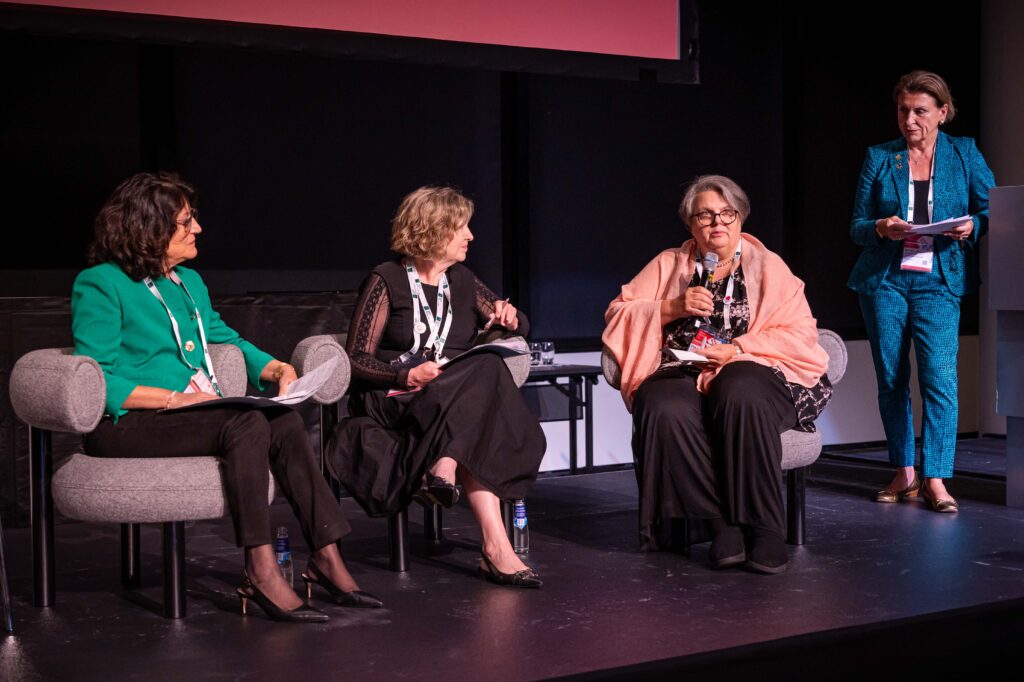
Barbara Lison used her President’s Session to reflect on her tenure and her presidential theme of building a sustainable future. She stressed that this didn’t mean sustainability in just an environmental sense, saying that a sustainable library field requires a sustainable IFLA.
Barbara spoke with passion about the Global Vision project which set out highlights, opportunities and challenges for the library sector as a whole. This extensive feedback exercise provided a structure for realising synergies that otherwise be missed. She related this to the first strand of IFLA’s 2019-2024 strategy, that of Strengthening the Global Voice of Libraries.
IFLA Governing Board member Jonathan Hernández Pérez spoke about the recent work that had been done on this first strand of IFLA’s strategy, particularly in the areas of advocacy and sustainability. Alejandro Santa, Regional Division Chair of the Latin America and the Caribbean region, was also introduced by Barbara and he talked about his work advocating Argentinian libraries and the work they were doing to promote UN Sustainability Development Goals (SDGs) in high level meetings with the United Nations.
The next strand of the Strategy which Barbara covered was IFLA’s work to Inspire and Enhance Professional Practice. This includes the work that has gone into the IFLA’s Library Map of the World. Barbara invited incoming IFLA President Vicki McDonald to discuss putting together the 3rd Edition of IFLA’s Parliamentary Guidelines with Josefa Fuentes – Chair of the Library and Research Services for Parliaments Section (IFLAPARL) and Ellie Valentine, an IFLAPARL Member. Josefa emphasised the role of librarians and others within the sector in helping to protect democracy in the context of threats such as Artificial Intelligence (AI).
Section three of the strategy looked at Connecting and Empowering the (Library) Field. Nthabiseng Kotsokoane, Chair of the IFLA Regional Council, discussed this theme with Dr. Dilara Begum from Bangladesh, Chair of the IFLA Professional Division C. This included a workshop she coordinated in her region which championed networking opportunities. The final strand of the strategy was the imperative to Optimise our Organisation. IFLA Treasurer Jaap Naber talked about this strand with incoming IFLA Secretary General Sharon Memis. Sharon shared some of her experiences of having worked for the British Council and the importance of libraries in that context. She went on to talk about the dedication of the team at IFLA and how humbling she finds the passion that volunteers show all across the world in their work towards shared goals. Sharon discussed optimising the Stichting IFLA Global Libraries Foundation (SIGL) fund and strategies for seeking other funders to support IFLA’s work. She also accepted that there were challenges, acknowledging that issues around the decision to hold the next World Library & Information Congress 2024 in Dubai had arisen which would need to be addressed and would require “healing”.
Barbara then encouraged attendees to stay on for a discussion session on IFLA’s strategy going forward, with further discussions to take place during the IFLA President-elect’s: Stronger Together session on Thursday 24 August.
How Can Libraries Accelerate Climate Empowerment?
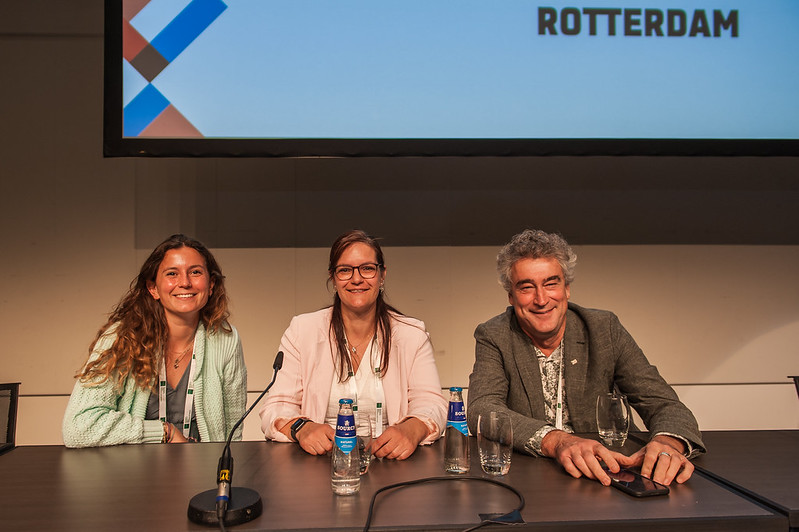
This engaging discussion ran as a participatory hybrid session, involving attendees both physically and online by inviting them to give their input via Mentimeter.
Lenneke IJzendoorn from the Action for Climate Empowerment (ACE) Focal Point gave an introduction to the session, underlining the risks posed by climate change and how imperative it is that more needs to be done. She talked about everyone being involved in this before going on to explain the crucial role librarians and information professionals can play in this critical work.
Erik Boekesteijn from the National Library of the Netherlands spoke animatedly about taking community action as librarians to try to get over “The Big Frikin’ Wall” as he described it between where we are and where we need to be on climate change issues – as well as overcoming obstacles along the way. He gave #23MobileThings as an example, developed by Danish Librarian Jan Holmquist, creating a framework whereby librarians and others involved in information work can get involved in climate action.
Sarah Oey – UN Youth Representative on Sustainable Development – then added her perspective as someone who inspires young people on the subject of climate change. She emphasised the risk of air pollution in particular and how young people are not always informed about it. Sarah encouraged librarians to run workshops on climate change, as well as collaborating with local government to actively put plans together towards making lasting impacts.
Claire McGuire from IFLA who co-ordinated the session then brought together feedback from in-person and online participants. Questions posed to participants included “Who should be involved?” when it comes to climate change, as well as the challenging area of how to measure impact. Attendees gave examples of how they had brought about changes, for instance one respondent from the United States talked about collaborating with the Environmental Protection Agency. Specific measures put in place suggested given too – an example was the loaning of air pollution monitors which could be borrowed by children so that they could assess pollution in their neighbourhoods.
The potentially huge outreach of libraries was spotlighted by Erik Boekesteijn during the discussion as a key feature advantage of what libraries can offer, through marketing and communication to the local population. Getting local populations involved as much as possible with environmental initiatives was Erik’s recommendation. One participant talked about how it could sometimes be helpful not to use the term “climate change” itself as it could “turn people off” but talk in turns of saving money, insulating your home or getting kids more active, as examples, instead.
In terms of measuring impact, counting actions taken, attempts to assess climate footprint and use of surveys were seen as important by respondents on Multimeter to encouraging evidence-based policy making.
Claire pointed to an IFLA Climate Survey being run in conjunction with the Monitoring and Evaluating Climate Communication and Education (MECCE) Project. and asked participants to take part in an online survey.
WLIC 2023 Hubs ambassadors
IFLA is thrilled to bring a new perspective from its different regions to registered online attendees. The four Hubs around WLIC 2023 are designed to promote increased inclusion and participation from registered remote delegates.
The aim of the WLIC Hubs is to enable discussion among the delegates around topics of interest to all. The sessions provide an expert speaker (an “ambassador”) to start the conversation followed by the opportunity for questions, conversation and sharing amongst those attending the sessions. Throughout the week, we’ll be interviewing the ambassadors would will tell you a little about themselves and their work as a Hub ambassador. The first interview is with our Middle East and North Africa Hubs ambassador, Ghada Al Mawlawi. In this video, Ghada reports on the first day of the Conference!
See the rest of the interviews on our YouTube playlist.
IFLA School Library Manifesto update
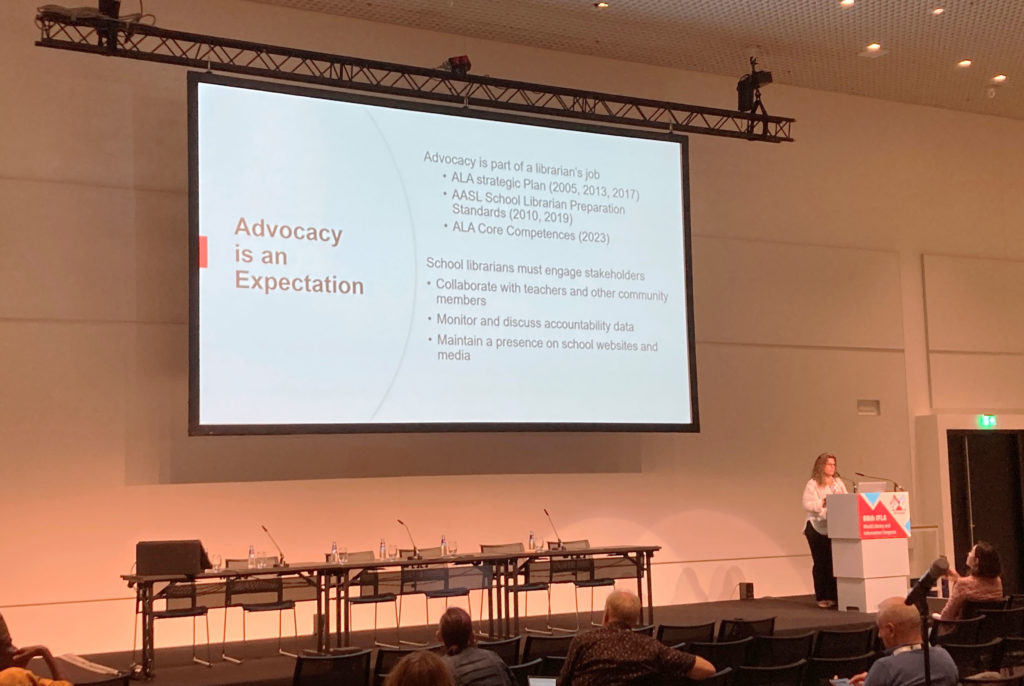
IFLA’s School Library Manifesto was approved in December 2022 by IFLA Governing Board and is due to be officially launched soon (provisionally in 2024) once it has been endorsed by UNESCO. As part of the preparations for this, the session brought together three speakers from libraries on three different continents, with each talking about education in their local countries.
Dr. Aliyu Abdulkadir Nasarawa State University spoke first about education standards in Nigeria. He explained the historical role of libraries in tackling low levels of numeracy and literacy within his country. Dr Aliyu went on to explain the ratio of teachers to pupils is low in Nigeria and how even some teachers showed poor reading abilities themselves, creating significant challenges when trying to ensure basic standards of education. Whilst the national policy guidelines under the Universal Basic Education (UBE) Act outline these standards, they have not been achievable in practice within the country and it was accepted that these needed to be reviewed. The IFLA School Library manifesto has helped in supporting this and working towards ensuring at least fundamental library provision. Dr Aliyu cited passages from the Manifesto, highlighting its vision in improving teaching and learning for the entire school through its libraries and trained library staff. In terms of funding dedicated to this work, what was previously a recommended 2% of schools’ funds going to libraries has been revised upwards as part of the policy review to 5%.
Next, Asiye Kakirman Yildiz from Marmara University in Turkey spoke about the School Library Manifesto’s role in helping to reduce inequalities within education standards in her country. An example is the setting up of homework clubs and workshops within private school libraries to enable these libraries to open up to and support disadvantaged children in particular. This has been successfully trialled with positive feedback from children and their families – encompassing over 1,000 participants in total. There were also requests from participants for robotics & coding training, along with chess clubs and art workshops. Asiye concluded that libraries in private schools can be used as a learning platform by opening these up for public benefit if they are organised in a structured way which is caters to pupils’ needs.
Finally, Elizabeth Burns from Old Dominion University in the United States talked about school library advocacy and how the School Library Manifesto could help with this work. At a time of decline in school library resourcing/staffing in the US, Elizabeth cited correlation studies showing the positive impact of school libraries on student learning and particularly how this can be instrumental in reducing inequalities. She talked about key areas where the Manifesto can support the work she is doing. The first of these was in emphasising how advocacy should be an expectation as part of librarians’ roles. Ensuring access to resources and services was a second area where Elizabeth felt the Manifesto could help, opening up resources for use. The third area was highlighting the impact of school librarians’ teaching on their pupils. Elizabeth also talked about the role of the School Library Manifesto in advising on strategic policy and community relations. She concluded by stating “Active advocacy creates awareness and support for strong, effective school libraries”.
The session, including the questions and answers at the end, highlighted the commonalities of school libraries in three very different settings and how the School Libraries Manifesto can contribute to reducing inequalities in education in each case.
IFLA Green Library Awards 2023*
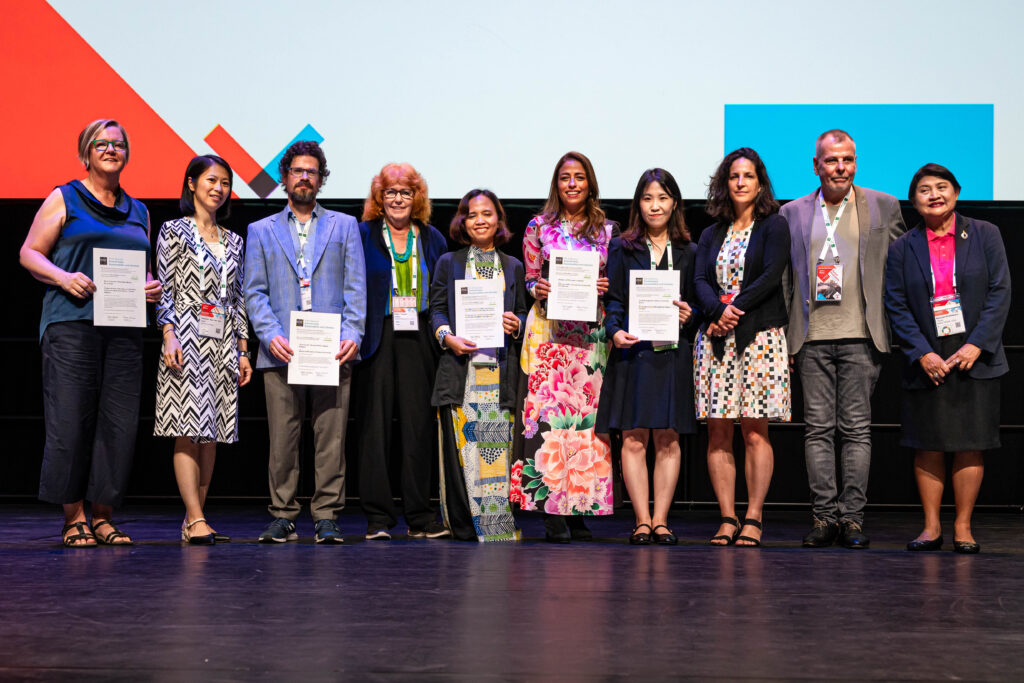
Sponsored by IFLA’s Environment, Sustainability & Libraries Section and De Gruyter Publishing, the IFLA Green Library Awards celebrate libraries which promote environmental and social sustainability. The six 2023 shortlisted honorees were the Valla Valle Public Library’s seed library, the Seoul Metropolitan Library’s eco projects including green spaces inside the library and upcycling bookbinding workshops, the West Vancouver Memorial Library’s climate writer in residence programme, the Vietnamese-German University’s inclusive library project, the Illyés Gyula Library of Tolna County’s project including greening the library service system, and Biblioteca EPM’s educational efforts for sustainable development.
At the session, Canada’s West Vancouver Memorial Library’s Climate Writer in Residence was awarded first place for Best Green Library Project. The first such project in the world in a public library, the Climate Writer in Residence combines literary and climate advocacy, connects cultural groups in the region, and includes efforts such as a garden with a native bee hotel and rainwater collection system. Northern Dene author and journalist Katłįà Lafferty, the Climate Writer in Residence, stated,
“Libraries are in a great position to be able to do the work of building bridges between community because they are a safe haven of trust and knowledge, and although an unassuming place for loudly changing the world outside a book, West Vancouver Memorial Library is doing just that.”
The Best Green Library Award was given to Colombia’s Biblioteca EPM. Their efforts were applauded for combining technological and educational aspects, including reducing energy usage through solar panels and the creation of multiple community groups, such as their reading group for children titled “Journey to the Sustainable Development Goals Club.”
Any library that includes sustainability efforts in their work is encouraged to submit their nomination for the 2024 IFLA Green Library Awards.
Watch the full live streamed recording on our YouTube channel.
*this article was amended on 24 August to correct the award categories.